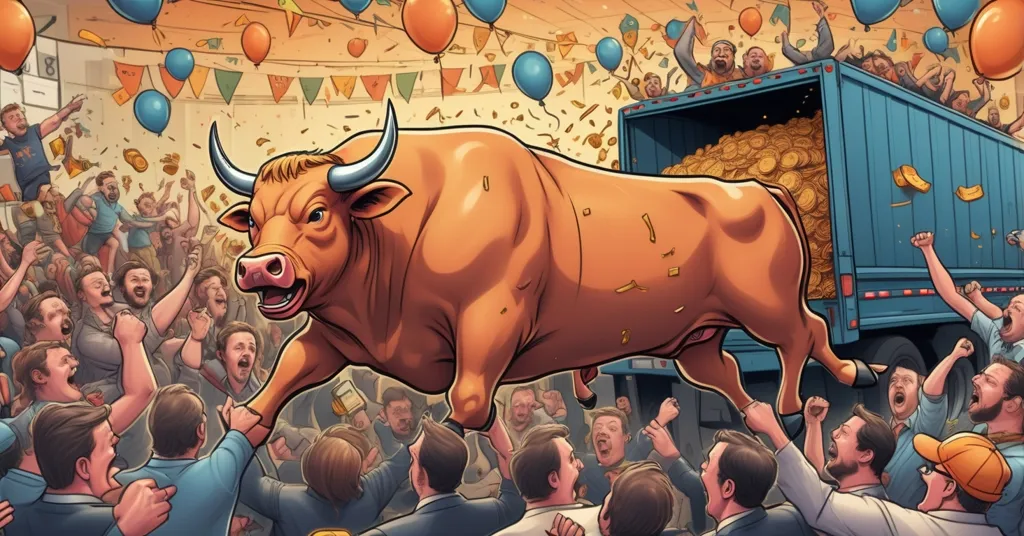Trump’s 2024 Win Sparks Bitcoin Surge, But Tariffs Trigger Market Chaos

Trump’s 2024 Re-election Triggers Market Euphoria and Trade Policy Turmoil
Donald Trump’s re-election in 2024 sparked an initial wave of celebration on Wall Street, driven by expectations of continued tax cuts and deregulation. However, the mood quickly shifted as the reality of his “America First Trade Policy” (a policy aimed at prioritizing U.S. economic interests through tariffs) began to set in. Signed into law on January 2025, this policy is set to take effect on April 2, introducing broad tariffs without traditional oversight.
- Trump’s 2024 re-election celebrated by Wall Street
- America First Trade Policy set to introduce tariffs on April 2
- Market volatility follows initial celebration
- Treasury and Commerce Secretaries back Trump’s tariff strategy
- Jamieson Greer’s efforts to structure tariffs overlooked
- Experts warn of economic damage, yet Congress remains inactive
Initial Market Reaction
Wall Street’s reaction to Trump’s victory was nothing short of a party, with Bitcoin prices skyrocketing to over $75,000 on election night. Investors were betting on a continuation of Trump’s first-term policies, expecting boosts to the economy. Bitcoin’s surge can be attributed to its reputation as a ‘safe haven’ asset during times of economic uncertainty, a role it played during Trump’s first term. However, the party didn’t last long. As details of the ambitious trade policy emerged, the euphoria turned to anxiety. The policy, effective April 2, 2025, aims to target over $1.4 trillion of imports with tariffs, a move that could reshape global trade dynamics and hit the economy like a sledgehammer.
Administration’s Stance
Trump’s economic team, including Treasury Secretary Scott Bessent and Commerce Secretary Howard Lutnick, have thrown their full support behind the tariff plans. Bessent, appearing on Meet the Press, described the market dips as “healthy,” suggesting a confidence that the markets would eventually align with the administration’s vision. Meanwhile, an official close to the president bluntly stated, “Tariffs are the policy,” signaling a no-compromise approach to trade.
These market pullbacks are healthy.
– Scott Bessent on Meet the Press
Tariffs are the policy.
– an official close to the president
Inside the administration, U.S. Trade Representative Jamieson Greer has been working tirelessly to add some structure to the tariff application process. His focus on creating internal systems and transparency is commendable but has largely been overlooked by the financial markets. Despite his efforts, the looming threat of tariffs without traditional checks and balances continues to weigh on investors’ minds.
Economic Implications
Economists and trade experts are sounding the alarm about the potential economic fallout. Analysts predict a slight decrease in the overall size of the U.S. economy (a 0.4 percent reduction in U.S. GDP) and the loss of over 300,000 jobs due to the new tariffs. The Council on Foreign Relations, CSIS, and the Scowcroft Group have all voiced concerns about the unchecked tariffs. Economist Brad Setser warns that the policy could disrupt supply chains, increase costs for businesses and consumers, and potentially damage U.S. competitiveness, particularly in states dependent on imports and exports.
However, some argue that tariffs could protect domestic industries and create jobs, though this view is not widely supported by economists. The potential benefits are often overshadowed by the broader economic risks, but they cannot be dismissed entirely. It’s a classic case of short-term gain versus long-term pain.
Congressional Response
Despite these warnings, Congress has been largely inactive. The House Ways and Means Committee, led by Jason Smith and Richard Neal, has not taken significant action to limit the executive’s trade authority. Senators like Chuck Grassley, Todd Young, and Bill Cassidy have expressed concerns about presidential trade powers, but MAGA-aligned figures such as Mike Johnson and John Thune have not pushed to curb Trump’s authority.
Congress should play a bigger role.
– Chuck Grassley on trade authority
Congress’s inaction is nothing short of a disgrace, leaving the economy vulnerable to Trump’s unchecked power. It’s like watching a train wreck in slow motion, with no one willing to pull the emergency brake.
International Reactions
While Wall Street and Washington grapple with the implications of Trump’s trade policy, the rest of the world is already reacting to the impending changes. The global trade landscape is poised for a significant shift, with potential retaliatory measures from trading partners and disruptions to supply chains on the horizon. It’s like watching a game of economic chess, with each move triggering a cascade of reactions.
Impact on Crypto Community
The crypto community is watching closely, as increased economic uncertainty could drive more interest in decentralized currencies like Bitcoin. Trump’s support for digital assets, including his promise to build a government stockpile of Bitcoin and to replace SEC Chair Gary Gensler, adds another layer of intrigue to the situation. The crypto industry’s influence in political races, such as the Ohio Senate race, further illustrates the sector’s stake in regulatory outcomes.
The Disconnect Between Market Expectations and Policy Reality
As we navigate this new era of trade policy, it’s clear that the disconnect between market expectations and policy reality is more pronounced than ever. The crypto community, in particular, should keep a close eye on how these developments might affect the broader financial landscape, including the role of Bitcoin and other digital assets in a world increasingly dominated by protectionist policies. It’s a reminder that in the world of finance, optimism must be tempered with a healthy dose of realism.
Key Takeaways and Questions
- What is the America First Trade Policy?
The America First Trade Policy is an executive order signed by President Trump, effective April 2, authorizing broad tariffs without requiring congressional approval or public input.
- How has Wall Street reacted to Trump’s re-election and his trade policies?
Wall Street initially celebrated Trump’s re-election, expecting economic growth, but later showed signs of volatility and confusion as the reality of his aggressive tariff strategy became apparent.
- Who supports Trump’s tariff plan within his administration?
Treasury Secretary Scott Bessent and Commerce Secretary Howard Lutnick have publicly supported Trump’s tariff plans.
- What efforts has Jamieson Greer made regarding the tariffs?
Jamieson Greer, U.S. Trade Representative, is working to create a structured process for applying tariffs, focusing on internal systems and transparency, though his efforts are largely ignored by Wall Street.
- What are the potential economic impacts of Trump’s tariff policy?
Economists and trade experts warn that Trump’s tariff policy could disrupt supply chains, increase costs for businesses and consumers, and potentially damage U.S. competitiveness, particularly in states dependent on imports and exports.
- How has Congress responded to Trump’s trade policies?
Congress has largely been inactive, with no significant actions taken to limit the executive’s trade authority despite concerns from some senators.
- What date is critical for the implementation of Trump’s trade policy?
April 2 is the critical date when Trump’s “America First Trade Policy” will take effect, marking a significant shift in U.S. trade policy.



